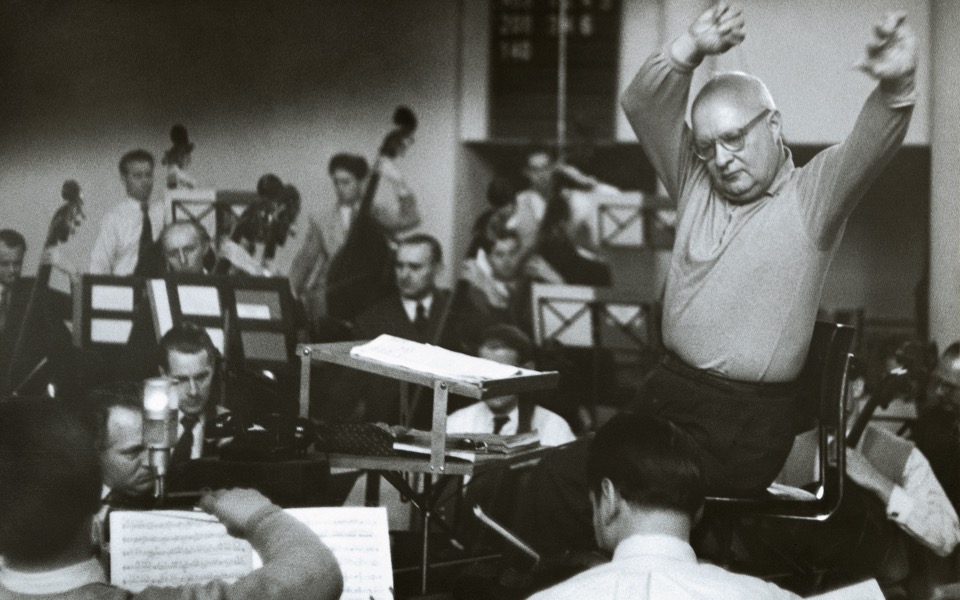Passion for classical music is driving force behind survival of vinyl

It’s around noon and I’m watching a 60-something-year-old man crossing out and circling the names of conductors, soloists, composers and dates as he looks for older and newer records for his collection. His list seems to comprise many pages and I wonder how long someone can spend at a record store.
“The passionate ones are really passionate. The crisis showed us that. They come in with lists and start looking,” says Anastasios Tsoufis, owner of Mousiki Prosfora (Musical Offerings), a record store specializing in classical music in downtown Athens.
Recent data from the International Federation of the Phonographic Industry (IFPI) showed the industry posted 3.2 percent growth at the end of 2015, after some two decades of decline. The second important finding of its annual report is that digital sales were greater than those for CDs or vinyl and that streaming services are the fastest growing source of revenue.
The music industry has been caught in a painful transition period for years now and it seems that record companies are finally starting to adjust to the new reality. Indicative of this change is a recent deal between Deutsche Grammophon and Apple Music (discussed below with DG president Clemens Trautmann), which will allow the legendary recording label to reach out to more than 10 million registered users.
A lot of work remains to be done, however, for this shift in international trends to start impacting on small markets such as the Greek one. Here, data from the local IFPI branch indicate a gradual decline in sales of classical music in physical form. However, according to the the branch’s technical supervisor, Nikos Stefanakis, the decrease in turnover needs to be viewed together with the drop in prices (which can reach as much as 50 percent), an absence of data for digital sales, and the fact that in terms of the overall market, classical music sales are taking up more of the pie.
“This shows us that there is a relatively stable base in an otherwise declining market that is not following the same pace of overall decline,” says Stefanakis.
The golden age of the Greek classical music market started in 1985 and lasted for around two decades, says Ilias Potouridis, owner of the specialized Opera record store.
“People loved opera and symphonic music. The greats like Karajan and Abbado were still alive. Now many companies are republishing their old work and pushing boxed sets with dozens of CDs at very low prices,” he says.
So, what is it worth to a classical musician to have a vinyl recording of their work today?
“Recording is a way for the musician to make his art accessible to a wider audience, to the specialized international media, radio etc,” says Simos Papanas, the Thessaloniki State Orchestra’s lead violinist who performed as a soloist on British violinist Daniel Hope’s latest DG recording. “It also serves the notion of a project, a thematic umbrella for a series of activities built around the recording.”
“A record is a passport for an artist’s work to become known in other countries and personally I see it as a testimonial of my work,” says pianist Vassilis Varvaresos, who recently recorded Schubert’s “Winterreise” with baritone Dimitris Tiliakos.
Album releases are usually followed by a series of concerts and many sales are made right after the event, explains Navis Classics label manager Daan van Aalst. This small company specializes in DSD256 high-resolution audio for downloads.
“Streaming is still not working for the smaller labels,” says Aalst. “It is interesting purely from the promotional point of view but the quality is poor and it is difficult to accept that streaming services force you to give away your music almost for free. I stopped all streaming a while ago since we found other ways to promote the artists and the label. Perhaps I will return to streaming in the future but for the moment I go for downloads only.”
Exploring new paths is nothing new for companies that want to stand out from the crowd. Besides the large multinationals, there are dozens of independents, such as Gimell, which specializes in Renaissance polyphony, or APR, which restores early 20th century piano recordings.
A similar quest brought Robert von Bahr, founder and CEO of Swedish label BIS Records, to Greece in the 1990s and resulted in a recording of Nikos Skalkottas’s Concerto for Violin with soloist Giorgos Demertzis, conducted by Nikos Christodoulou.
“For BIS it was an experiment that was very successful and led to the decision to record Skalkottas’s entire body of work. It was a historic moment for the opus of a Greek composer whose work, like that of other Greek composers, was not regarded as part of the national legacy, as is the case in other countries,” Demertzis says.
Demertzis was around when Greek label Columbia was in its prime, a time when a truckload of equipment was needed to make one recording. Despite advances in music technology, there is one thing that remains unchanged today. “A good performance is the only thing people remember. The difference is that the stage has become much bigger and this is something I find extremely interesting in terms of healthy competition,” says Myron Michailidis, chief conductor and artistic director of the Greek National Opera. During his time as director of the Thessaloniki State Orchestra, an ensemble with a prolific recording history, Michailidis recorded works by Beethoven with legendary pianist Aldo Ciccolini, while it was with him that the GNO produced its first DVD, of Charles Gounod’s “Faust.”
“A recording imprints the artistic identity of an artist or an ensemble at a given time. The connection an orchestra has with, for example, the work of Tchaikovsky or Beethoven, is clearly reflected in a recording. It is also a useful tool for assessing the overall career of an artist or an ensemble, the quality of their performance, their stylistic approach, the historical aspect of that approach and their connection to international developments,” he says.
Also read: Digital sales, subscriptions are sustainable model, says DG chief





